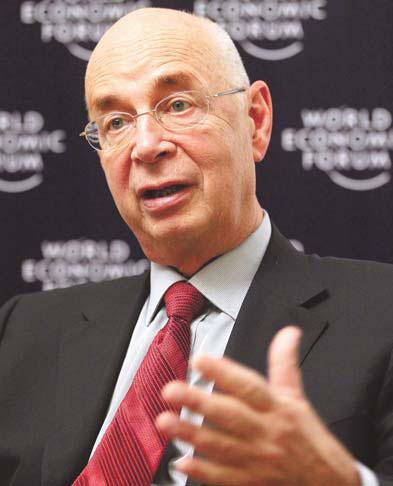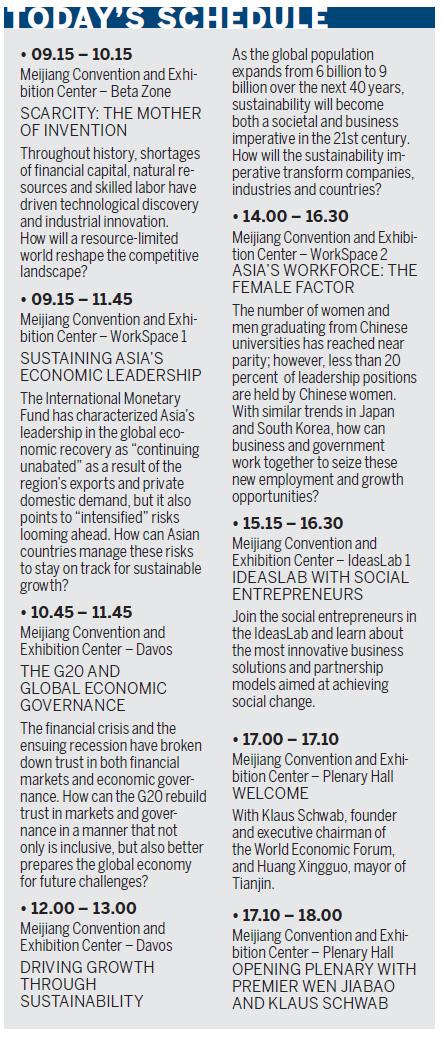
Klaus Schwab: "What we need is cooperation." [Yang Shizhong / China Daily]
Governments, businesses and society at large need to work together on problems
The world's many thorny issues can only be solved through the collective wisdom of governments, businesses and society at large, said Klaus Schwab, the founder and executive chairman of the World Economic Forum (WEF) ahead of today's opening of the Summer Davos forum in Tianjin.
The forum, organized by WEF and also called the Annual Meeting of the New Champions 2010, has the theme "driving growth through sustainability" at a time when the world still faces many economic challenges - from further economic slowdown to pressure on the environment.
"The basic principle of the world economic forum is to serve the world by having a platform on which different parts of society can interact because it's our belief that the global issues cannot be solved by government or business alone," said Schwab in an exclusive interview with China Daily. "What we need is cooperation."
To push forward cooperation in a global effort to revive global growth, the forum has become more inclusive this year, attracting not only business leaders, government officials and community leaders, but also for the first time inviting two Chinese citizens, from Chengdu and Shanghai, who stood out in an online competitive debate and will attend the discussions from September 13 to 15.
They will act as community representatives at the meeting, interact with world leaders and represent the general public in dialogue. This is the first time the forum has opened to ordinary citizens through online video submission in China.
The forum "is inclusive in many ways", Schwab said. "We have entrepreneurs, we have women leaders and we have civil society leaders. When people ask how Davos is different from other meetings, I think the first is that it is based on broad participation of not only business, but government, science, and civil society."
"We are very satisfied that we have more participants this year despite the fact that we only accept people whom we invite and who can contribute to the discussions," Schwab said.
More than 1,500 people from 85 countries and regions will participate in the meeting and the shining stars may not be the chief executive officers of big multinationals, but promising young entrepreneurs who could reshape the world in 10 or 20 years.
"We have people from large companies but particularly we have what we call the new champions, new champions that are companies which in 10 to 20 years may be on the Fortune top 500 list," said Schwab. "(They are) small companies, very entrepreneurial companies, companies which are now developing global dimensions."
Participants also include "companies which have shown a strong sense of social and environmental responsibilities", he said.
Special Coverage:Summer Davos 2010 in TianjinSchwab gave assurances that the forum would not be a meeting in which participants listen to a speaker. "It's much more a workshop where you all work together and you have a dialogue," he said. "It's not passively listening to the speaker; it's two-way communication, true interaction."
Schwab recognized China's effort to achieve sustainable growth.
The country has been trying to shift from an export- and investment-centered growth model to one based on consumption and domestic demand. It has also vowed to cut carbon dioxide emissions per unit of gross domestic product in 2020 by 40 to 45 percent compared with the level of 2005.
"I think the forum's theme of sustainable growth is very compatible for China because China is a leader in development of sustainable technologies," he said.
"I'm very much looking forward to the Tianjin meeting."
The meeting will officially start this afternoon, with Premier Wen Jiabao scheduled to attend the opening ceremony chaired by Schwab.
The WEF is commonly known as the Davos Forum because its annual meeting is held every January in Davos, Switzerland.
The WEF, in cooperation with China, also organizes the Summer Davos Forum to discuss pressing issues facing the world.






